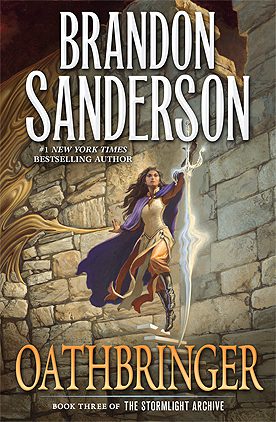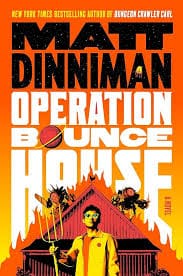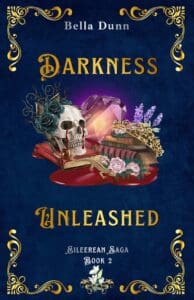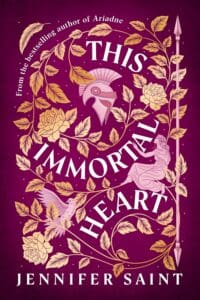Rating: 8/10
Synopsis
In Oathbringer, the third volume of the New York Times bestselling Stormlight Archive, humanity faces a new Desolation with the return of the Voidbringers, a foe with numbers as great as their thirst for vengeance.
Dalinar Kholin’s Alethi armies won a fleeting victory at a terrible cost: The enemy Parshendi summoned the violent Everstorm, which now sweeps the world with destruction, and in its passing awakens the once peaceful and subservient parshmen to the horror of their millennia-long enslavement by humans. While on a desperate flight to warn his family of the threat, Kaladin Stormblessed must come to grips with the fact that the newly kindled anger of the parshmen may be wholly justified.
Nestled in the mountains high above the storms, in the tower city of Urithiru, Shallan Davar investigates the wonders of the ancient stronghold of the Knights Radiant and unearths dark secrets lurking in its depths. And Dalinar realizes that his holy mission to unite his homeland of Alethkar was too narrow in scope. Unless all the nations of Roshar can put aside Dalinar’s blood-soaked past and stand together–and unless Dalinar himself can confront that past–even the restoration of the Knights Radiant will not prevent the end of civilization.
Review
Oathbringer throws open the curtains and lights up the much larger stage the first two books have been working on. Reeling after the events of the second book, we’re brought into Urithiru of legend and are shown just how small the events of the Shattered Plains were, but just how large the wave of events that rippled out from it and across Roshar are. Oathbringer is a slower – more thoughtful – and fuller of political intrigue book that the first two. This is a book of discovery and rediscovery. And loss. This is a book where even the shadows wield knives, that demonstrates humans mess up … and mess up again, but also pull each other through great change.
To summarise (as usual, and in very brief sentences), Oathbringer takes place directly after the second, where Urithiru is newly discovered but already there’s blood shed in its walls. Dalinar sets Adolin to the task of finding the murderer, Shallan doing her own work to discover ill-intent at the command of the Ghostbloods, while Dalinar himself is tasked with uniting the countries, and building a coalition of humanity that can face the Voidbringer threat; this book is mainly focused on that journey, Dalinar weaving his way through courtly politics, finding a way to bring other world leaders to Urithiru, while navigating his past – that seeps back to him in broken memories. It is not visions of the distant past, but his own atrocities that plague him this time. Meanwhile, Elhokar and a team set off to take Alethkar back from Voidbringer hands – a strike force including Kaladin, Shallan and some of Bridge Four. I leave out a lot of detail here, because it would take me some 1200 pages to recap the entire events. This time I only liked the plot, I didn’t love it. There’s certainly a whirlwind of plot points here – ones that made me laugh, almost brought a tear to my eye and certainly tightened my chest, leaving me anxious. But, as I look back at this story I couldn’t believe it all happened in the same novel. In some part, this is because the middle dragged on. I really did not enjoy the trip to Shadesmar as I thought it only prolonged the trip to the ending.
If you thought the world-building was done, Sanderson throws open the doors to a while closet full of the stuff in this one; I particularly enjoyed learning about the Unmade, a group of nine spren on the side of Odium, and the monsters and destruction that the Voidbringers bring with them. Also, the coming of more Radiants. And, in particular, I loved Shallan’s exploration of Urithiru that seems to involved all of the previously mentioned aspects.
I really am thankful for Shallan (which we see in turmoil internally) because of the information we get from her parts. She really is second to none. A character that can sit with all classes of people, who can outdrink the best of them, fight the worst of them and go toe-to-toe with the most intelligent. Shallan is the superstar of this series for me. She’s funny, quick, witty and is – in most cases – the answer to everyone’s problem. Yeah, she’s not the warrior that Kaladin is, but she’s much more. Her short (by Sanderson standards) stint as a kind of detective in Urithiru opens the doors to the Unmade and leads us into despair, then out of it again. And also turns her into my favourite kind of hero – one that looks at all the facts and pieces them into a plan of action. The struggle of her identities and the way it effects those close to her, the internal exploration of which one of those identities she is came to the forefront here. It added some much depth to her character in such a clever and fresh way.
It was the turn for Dalinar’s flashbacks in this one, which quite magnificently tied into a plot point with a huge payoff at the end. The Thrill – what I thought as only a natural excitement for battle – turned out to be much more harrowing. Something that made Dalinar the Blackthorn, who we unfortunately get to meet properly in his flashbacks; he was not the man I thought he was. Not a great warrior really, just a bloodthirsty lunatic with sword and armour that made him nigh unstoppable. With a strong, conqueror family behind him. It made me hate Dalinar but went a long way to explain the man he was. No shortage of despair was wrought at his own hands, but the journey he took away from that, and its claws that came back for him, gripped me.
I will just say that the ending was epic and so many pages were spent on such a great action-sequence. One of my favourites, which I will not mention for spoiler reasons, made their way back onto the scene in such an epic-few-pages that I found my love for Oathbringer spilling back. Another annoyance though, at the end, was that we really know little more about Wit – the most intriguing of all – other than teased bits. Alas, I will have to continue the series, poor me (not.)
Read Oathbringer, love it, stay with it and forgive it for being slightly less action-packed than the first two. It’s well-worth it. In such a long series, you need books like this to broaden horizons, set the scene and move pieces. I love the Stormlight Archive and I hope you will give it a chance, too.





Leave a Reply